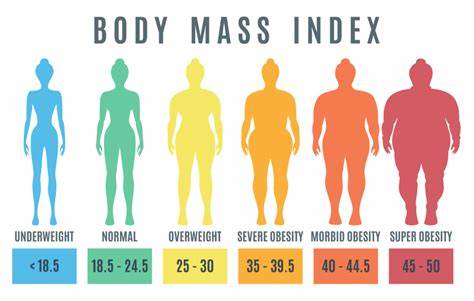In a world that glorifies a specific body type, it can be challenging to maintain a positive body image. Body Mass Index (BMI) is a measurement that compares your height and weight to determine your body fatness. While BMI can be useful, it’s not always an accurate indicator of health. BMI can impact your mental health and body image, leading to low self-esteem, depression, and eating disorders.
This article will explore the impact of BMI on mental health and body image. We’ll examine how BMI can affect mental health and provide tips for managing the impact of BMI on your mental health.
The Impact of BMI on Mental Health
BMI can impact mental health in several ways. Here are a few ways that BMI can affect mental health:
- Low Self-Esteem: BMI can influence self-esteem. When individuals have a high BMI, they may feel self-conscious and have low self-esteem. Low self-esteem can impact mental health and lead to depression and anxiety.
- Depression: Research has shown that individuals with a higher BMI are more likely to experience depression. Depression can impact an individual’s quality of life and lead to negative coping mechanisms.
- Eating Disorders: BMI can also be a risk factor for eating disorders. Eating disorders can impact an individual’s mental and physical health and can lead to severe health complications.
Managing the Impact of BMI on Mental Health
While BMI can impact mental health, it’s essential to remember that BMI is not the only indicator of health. You can use an online NHS BMI calculator for calculating BMI. Here are a few ways to manage the impact of BMI on mental health:
- Focus on Health: Instead of focusing solely on BMI, focus on overall health. Eating a balanced diet, staying physically active, and getting enough rest can improve mental and physical health.
- Seek Professional Help: If you’re struggling with low self-esteem, depression, or an eating disorder, seek professional help. A mental health professional can provide you with the tools to manage your mental health and body image.
- Surround Yourself with Positive Influences: Surround yourself with individuals who have a positive body image and focus on self-care. Having a support system can make a significant impact on your mental health.
The Impact of BMI on Body Image
Body image is a person’s perception of their physical appearance. BMI can impact body image in several ways. Here are a few ways that BMI can affect body image:
- Stigmatization: Individuals with a high BMI may experience stigmatization from others. Stigmatization can lead to negative body image and low self-esteem.
- Media: The media often portrays a specific body type, leading to unrealistic expectations. Individuals with a high BMI may feel pressure to conform to societal beauty standards, leading to negative body image.
- Eating Disorders: BMI can also be a risk factor for eating disorders. Eating disorders can impact an individual’s mental and physical health and can lead to severe health complications.
Managing the Impact of BMI on Body Image
Managing the impact of BMI on body image is essential for maintaining positive mental health. Here are a few ways to manage the impact of BMI on body image:
- Practice Self-Love: Practice self-love by focusing on your strengths and accomplishments. Remember that your worth is not determined by your BMI or physical appearance.
- Surround Yourself with Positive Influences: Surround yourself with individuals who have a positive body image and focus on self-care. Having a support system can make a significant impact on your body image.
The Impact of BMI on Mental Health and Body Image FAQs
Q: What is BMI?
A: BMI is a measurement that compares your height and weight to determine your body fatness.
Q: Is BMI an accurate indicator of health?
A: While BMI can be useful, it’s not always an accurate indicator of health. BMI does not take into account muscle mass or bone density.
Q: How does BMI impact mental health?
A: BMI can impact mental health in several ways. It can lead to low self-esteem, depression, and eating disorders.
Q: How does BMI impact body image?
A: BMI can impact body image by leading to stigmatization, pressure to conform to societal beauty standards, and negative body image.
Q: How can I manage the impact of BMI on my mental health and body image?
A: Focus on overall health, seek professional help if needed, surround yourself with positive influences, practice self-love, and challenge societal beauty standards.
Conclusion
In conclusion, the impact of BMI on mental health and body image is significant. BMI can lead to low self-esteem, depression, eating disorders, stigmatization, and negative body image. While BMI can be useful, it’s essential to remember that BMI is not the only indicator of health. Focusing on overall health, seeking professional help if needed, surrounding yourself with positive influences, practicing self-love, and challenging societal beauty standards can help manage the impact of BMI on mental health and body image. Remember that everyone’s journey is different, and it’s essential to prioritize your mental and physical health above all else.



